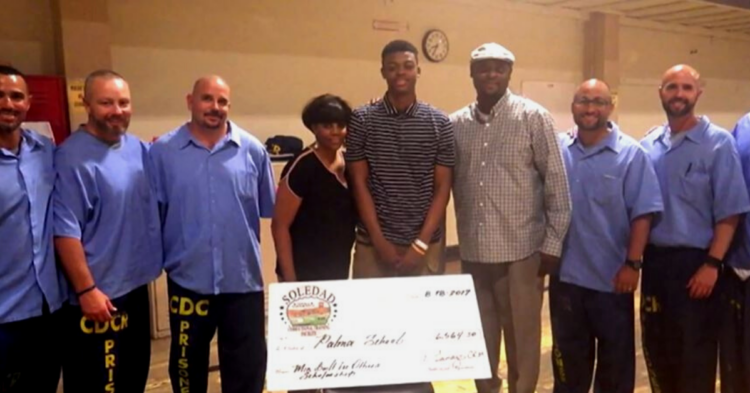In the state of California, the base pay for incarcerated people is just 8 cents an hour. If you happen to have an industry job, you can expect to make $1 an hour, which amounts to around $100 a month.
When you consider just how little these individuals make for completing such jobs as sweeping floors, building furniture, and clerking, it certainly seems impossible to save up a huge sum of money.
But that didn’t stop hundreds of prisoners from pooling their earnings together over the span of nearly three years so they could help pay for a local teen to go to college.
Almost 800 inmates at the Soledad State Prison contributed to the student’s fund, which raised an incredible $32,000 — $24,000 of their own money, and $8,000 in donations from outside the prison.

As CBS News reported, the fundraiser all began in the prison’s “Exercises In Empathy” book club, which includes both inmates and students from Salinas’ Palma School.
“It was incredibly refreshing to have young men come into a space with us and see us as what we are, which is people,” former inmate and club member Jason Bryant told CBS News ,
It was during one of those discussions that Bryant first heard about Ernest Gordon’s book, “Miracle On The River Kwai.”

In the novel, Gordon describes his experience as a prisoner of the Japanese during World War II, and the ways in which his fellow prisoners created a culture of sacrifice for each other called “mucking”.
Bryant walked away from the discussion feeling inspired to “muck” for someone as well, someone outside of the prison system.
He and his co-defendant, Ted Gray, came up with a plan — they would enlist the help of other prisoners to establish a scholarship fund for a Palma student in need.

Starting in 2016, every month those willing participants would put the money they had earned while working various jobs towards building up the fund, which gradually grew to an incredible $32,000 in nearly three years.
“Incarcerated people were so drawn to [it],” Bryant told CBS. “The idea of going a mile deep in a young man’s life, that they were giving up their month’s pay to contribute.”
When Mia Mirassou and Jim Micheletti, the founders of the “Exercises in Empathy” book club, learned of the inmates’ “muck”, they knew just which student deserved to receive the scholarship.

Sophomore Sy Green’s family was on the brink of being unable to pay for his college tuition after his father, Frank, had heart transplant surgery, his mother lost her vision, and both parents ultimately lost their jobs.
“That was a financial burden, with all the medical bills and stuff,” Sy told CBS.
When he learned that hundreds of prison inmates the family had never met before had worked together to pay for his son to go to college, Frank admitted it brought him to tears.

“At that particular time, it was a truly a blessing,” he told CNN . “It was unheard of.”
“I was mind-blown,” Sy told CBS of his own reaction to the incredible scholarship. “And then immediately, I was just grateful.”
Sy graduated from Palma last year, and is now a 19-year-old freshman student at college where he plays basketball and studies sports broadcasting.

He and his family have maintained a strong bond with the inmates at Soledad State, where they began making regular visits and also joined the “Exercises in Empathy” book club.
Four former inmates even attended Sy’s high school graduation last year, including Bryant, and he plans on continuing to visit the prison during breaks from school.
“That’s only the right thing to do,” Sy told CNN . “Beyond the scholarship, the knowledge that they pour into you, that’s, that’s the best thing. They definitely take my future serious and they genuinely do care about me as a person.”
While the coronavirus outbreak has now moved the book club’s meetings online, students are still able to join the inmates to discuss their readings over Zoom.

The inmates also plan on continuing their scholarship fund to help other students in need be able to pursue their education, and hope that their story inspires other members of their community to do the same.
“I don’t know about redemption,” Bryant, who’s sentence was commuted in March, told CNN . “I can say this, I know that those of us who have truly transformed our lives are committed to adding value in any way that we possibly can.”
















































